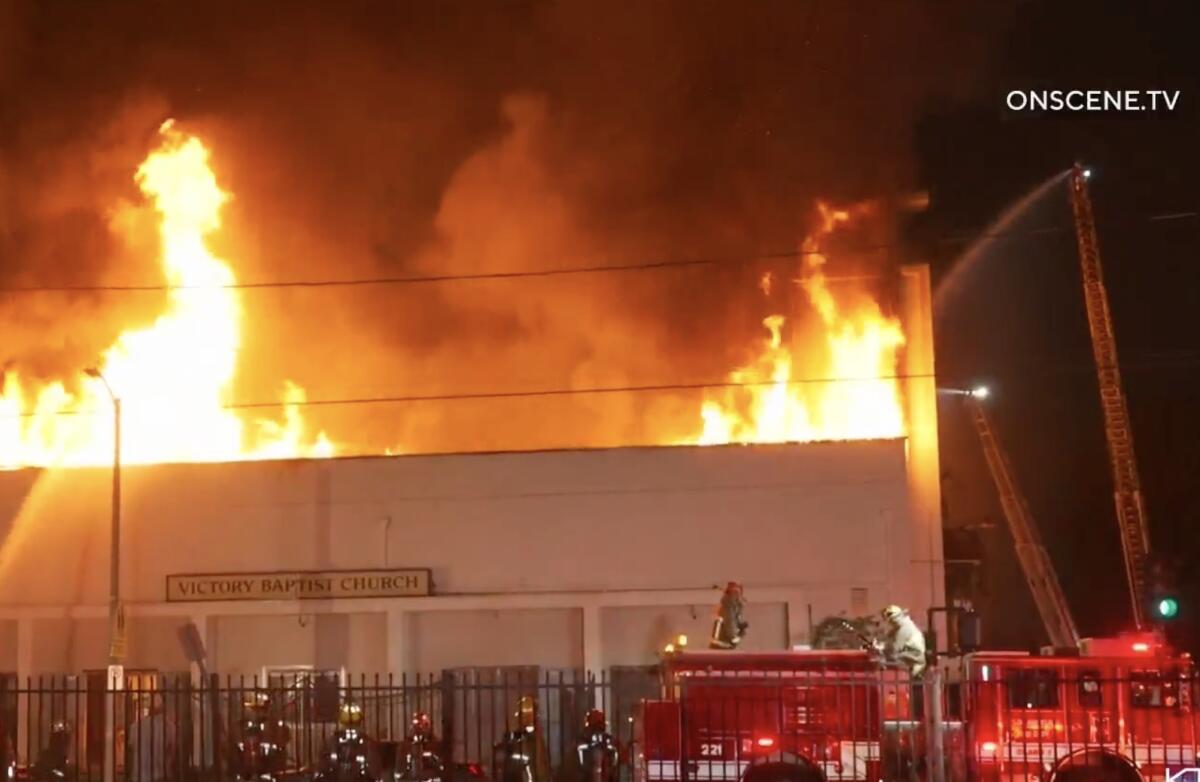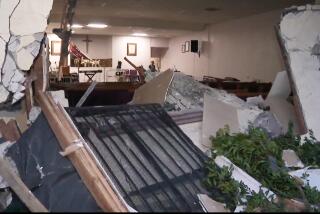Fire destroys ‘a humble giant’ of L.A. churches

As arson investigators from the Los Angeles Fire Department combed through the charred and smoldering remains of Victory Baptist Church on Sunday, the spiritual community of South Los Angeles slowly came to terms with the loss of this historic landmark.
“The building is destroyed, but the church still lives,” said Pastor W. Edward Jenkins, as heavy equipment began knocking down fire-damaged walls. “The church is not dead. The church is doing fine. The building is in ruins, but we are going to rebuild.”
The church, founded in the 1940s and located west of the famed Central Avenue — the heart of Black Los Angeles nearly 75 years ago — was a destination for gospel singers, civil rights activists and congregants looking for a familiar home in the midst of a rapidly changing, gentrifying city.
“This is a terrible loss,” said historian Tyree Boyd-Pates, who helped curate an exhibition at the California African American Museum about gospel music in Los Angeles that included Victory Baptist Church. “It is hard to process, given the church’s role in Los Angeles especially for African Americans who moved here during the Great Migration of the 1940s.”
The blaze broke out at 2:22 a.m. Sunday, said Nicholas Prange, a spokesperson for the Fire Department, and rapidly grew to major emergency status, requiring responses from at least 16 companies.
Two firefighters sustained injuries during a battle that lasted two hours, Prange said. They were inside the church when one became trapped by a collapsing ceiling and walls. A mayday call was initiated, and the firefighter was rescued and taken to a hospital with moderate injuries. The other firefighter sought treatment for mild injuries after the incident concluded.
After the blaze was extinguished, arson investigators and members of the House of Worship Task Force — a multi-agency effort that seeks to identify and capture individuals who target churches in Los Angeles — began their inquiry into the possibility the fire had been set intentionally.
Standing in front of the church’s ruins, Donald Hambrick was in tears. The 76-year-old attorney described how after coming to Los Angeles with his family from Louisiana in 1958, Victory Baptist Church was a source of inspiration.
“I learned about being Black, being proud, about the importance of education here,” he said. “I learned how to dream.”
“A piece of history burned today,” said congregant Pat Smith who arrived on scene not long after the fire began. “This was part of our lives.”
Jenkins’ son, Jahi, said a few items had been salvaged: pulpit chairs, portraits of former pastors, church documents and the church sign in front.
Throughout the decades, Victory Baptist Church has provided a valuable stage for the spiritual and political developments of South Los Angeles. With two choirs and the Wrecking Crew Male Chorus, music has always been at the heart of its message.
Sounds of uplift and salvation filled the church, whether it was on Sunday mornings or during choir rehearsals on Wednesday and Saturday. As with many Black congregations in the city, services at Victory Baptist Church were celebratory occasions. Women often arrived wearing elegant hats and matching gloves and men in suits.
Last Sunday before Jenkins took to the pulpit for the weekly Victory Hour, a video posted on the church’s website showed Rev. Randy Allison at the piano and Jahi on drums, setting a beat for the opening hymn sung by William Yancey.
Now let us have a little talk with Jesus,
Let us tell Him all about our troubles
He will hear our faintest cry
He will answer by and by....
Founded by Arthur Atlas Peters in a local storefront on Easter Sunday in 1943 by 14 members of the community, the church moved into its current building a year later. In the 1950s, its Sunday night services were broadcast on Channel 11 during prime time. The congregation soon grew to 3,000.
The church, along with St. Paul Baptist, Mount Moriah Missionary Baptist, Opportunity Baptist and Grace Memorial Church of God in Christ, has long provided community through music in the Black neighborhoods of the city.
Several musicians made Victory Baptist Church their destination, including soprano Dorothy Maynor, gospel singer Mahalia Jackson and singer and actress Ethel Waters. Renown trumpeter Louis Burke, whose 18-piece orchestra played throughout the city, was honored at Victory Baptist Church upon his death.
“Victory is a humble giant in our own backyard,” Boyd-Pates said. “It pioneered not only gospel music but also social activism in Los Angeles.”
Victory Baptist Church played an important role in voter registration drives and civil rights fundraisers, and was a destination for congressmen, state legislators, council members and community activists.
The Rev. Martin Luther King Jr. preached at the church in 1959 and again in 1964. He returned a year later after the assassination of Malcolm X, months before the Watts Riots.
Former city Mayor Tom Bradley stood before the church congregation in 1991 to pay tribute to the life of Gilbert Lindsay, the first Black L.A. city councilman.
A mayoral candidates forum, sponsored by the South Central Political Action Committee, was held at the church in 1993. In 2001, mayoral candidate Antonio Villaraigosa took to the pulpit at the church to speak to the congregation.
For the record:
8:21 a.m. Sept. 12, 2022An earlier version of this article said Holly Mitchell was campaigning for the 2nd District on the L.A. County Board of Supervisors. Mitchell currently represents the 2nd District.
On Sunday, Los Angeles City Councilman Curren Price was on scene, and Holly Mitchell, who represents the 2nd District on the L.A. County Board of Supervisors, called Jenkins with her support.
The church has faced adversity before. In 1975, pastor Peters, who was known in Los Angeles as “The Good Shepherd” and started the state’s first Black church-owned day and nursery school, was murdered in his home by intruders.
But Victory Baptist Church endured, growing under the leadership of its new pastors even as the demographics of the neighborhood changed from predominantly Black to Hispanic.
“Victory has been a beacon for the community,” said Jenkins, describing the church’s outreach ministries for food and clothing. “The community depends on us.”
“This church has weathered a lot,” Boyd-Pates said. “It is an institution that wholeheartedly believes in spirit-filled themes. It has remained prepared for changes and the winds of life, and their faith has allowed them to weather these storms.”
“Whatever the next step may be,” he said, “I imagine the church will survive and persist in the decades to come.”
More to Read
Sign up for Essential California
The most important California stories and recommendations in your inbox every morning.
You may occasionally receive promotional content from the Los Angeles Times.












